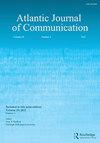Vaccine confidence in New Zealand: understanding the influences of demographic characteristics and patient self-advocacy
IF 1
Q3 COMMUNICATION
引用次数: 0
Abstract
ABSTRACTBased on uncertainty management theory, this study examined the extent to which demographic factors and patient self-advocacy predict COVID-19 vaccine confidence in New Zealand. Based on a nationally representative sample of 1852 New Zealanders, the results revealed various demographic factors and belief in one’s ability to get vaccinated were significant predictors of vaccine confidence. Additionally, patient self-advocacy was a significant predictor of confidence, with individuals who seek out more information having more confidence and those who are more prone to nonadherence to provider instructions having less confidence. Implications for uncertainty management theory, vaccine confidence, patient self-advocacy, and public communication campaigns during pandemics are discussed. Disclosure statementNo potential conflict of interest was reported by the author(s).Notes1 A term from Māori language to denote white settlers and which now means non-Māori (usually white) citizens of New Zealand who have been born in New Zealand or have lived in New Zealand for a substantial period.2 The first main therapy using similar technology was approved by the FDA in 2018: Patisiran developed by Alnylam Pharmaceuticals was approved for the treatment of the polyneuropathy of hereditary TTR-mediated amyloidosis (hATTR) in adults.3 Note papers was retracted after publication.Additional informationFundingThe work was supported by the Massey Business School.新西兰的疫苗信心:了解人口特征和患者自我宣传的影响
摘要基于不确定性管理理论,本研究考察了人口统计学因素和患者自我倡导对新西兰COVID-19疫苗信心的预测程度。基于1852名新西兰人的全国代表性样本,结果显示,各种人口因素和对接种疫苗能力的信念是疫苗信心的重要预测因素。此外,患者自我倡导是信心的重要预测因素,寻求更多信息的个体更有信心,而那些更倾向于不遵守提供者指示的个体则更缺乏信心。讨论了大流行期间对不确定性管理理论、疫苗信心、患者自我倡导和公共传播运动的影响。披露声明作者未报告潜在的利益冲突。注1:来自Māori语言的一个术语,指白人定居者,现在指在新西兰出生或在新西兰居住了相当长一段时间的non-Māori(通常是白人)新西兰公民FDA于2018年批准了首个使用类似技术的主要治疗方法:Alnylam制药公司开发的Patisiran被批准用于治疗成人遗传性trr介导的淀粉样变性(hATTR)的多发性神经病变论文发表后被撤回。这项工作得到了梅西商学院的支持。
本文章由计算机程序翻译,如有差异,请以英文原文为准。
求助全文
约1分钟内获得全文
求助全文

 求助内容:
求助内容: 应助结果提醒方式:
应助结果提醒方式:


